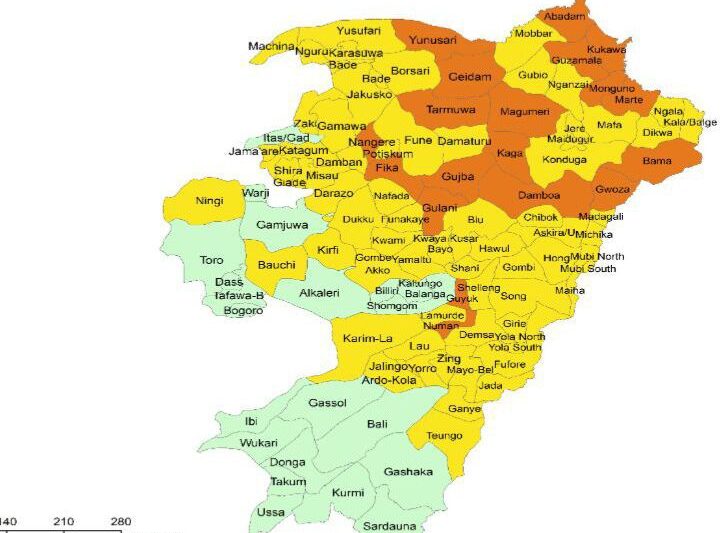Climate change, fuel subsidy removal, widespread flooding and drought in some areas, rural banditry, inflation, increased attacks on farmers, rising fertiliser prices and insecticides are the key drivers of food insecurity.
More than four million people are facing a food crisis in Nigeria’s Borno, Adamawa, Yobe, Bauchi, Taraba and Gombe states – and the figure is projected to increase to more than 5.5 million people before August 2024 if urgent action is not taken.
This is according to the November 2023 report by Cadre Harmonisé, a government-led and United Nations-supported food and nutrition analysis.
Climate change, the removal of the fuel subsidy, widespread flooding and drought in some areas, rural banditry, inflation, increased attacks on farmers, rising fertiliser costs and insecticides have been identified as the key drivers of food insecurity.
Insecurity – including the insurgency, kidnapping and banditry; the escalating inflation rate which directly affected a household’s food consumption and livelihoods was fuelled by the exorbitant cost of petrol and the resulting prohibitive cost of food and other essentials.
Limited income-generating activities and loss of jobs and other livelihood activities; limited access to potable water coupled with poor safe drinking water, sanitation and hygiene (WASH) practices; cropland loss emergency, especially in the northeast and some parts of north central and the northwest due to insecurity, were restricting factors.
This was revealed during the National Consolidated and Result Release/Dissemination held in Abuja, Nigeria’s capital, on Friday, November 3.
Professor Abba Gambo, the adviser to Nigeria’s 36 state governors on agricultural, food security and efficiency, told RNI that the alarming trend was disturbing and there was a need for governors of the northeastern region, particularly the three most severely affected states Borno, Adamawa and Yobe, to provide accelerated and consolidated action to cushion the negative effect of food shortages on the local population, internally displaced persons and resettled communities.
Gambo described the situation as scary, saying: “The report is disturbing but, for me, as someone who comes from Borno State, it does not come as a surprise.
“I know of women who go out every day to pick the rinds, the tough outer layer, of watermelons, boil them, put in some spices and that is what they give to their children because they are starving. Something needs to be done urgently to alleviate the food crisis in the region. People are starving and the number is escalating almost every day.”
Dr Abubakar Suleiman, the representative of the United Nations Food and Agriculture Organisation (FAO) disclosed that an additional 2.6 million people in Sokoto, Zamfara and the Federal Capital Territory, Abuja, and other states from Nigeria’s northern region would also all be affected by the food crisis by August next year.
He said the current situation had been caused by low fall and inconsistent rains during the wet season, insecurity, including the insurgency, kidnapping and banditry, and farmer-herder clashes.
The planting season started in June in northeastern Nigeria, with farmers mostly engaging in rainfed agricultural practices.
The FAO said more than US$68 million was urgently required to continue supporting households in the current agricultural season, as well as to begin the procurement of seeds and other inputs in time for the dry season.
Most crisis-affected households in Adamawa, Borno and Yobe are smallholder farmers who depend on agriculture for their livelihoods.
Providing them with essential inputs was crucial to the humanitarian response. For example, investing US$170 in a crop production package enabled a farming household of seven people to produce staple food for about a year.
“The situation is alarmingly disturbing. We need to come together as one to find a reliable solution to this problem because every minute counts. And we must put all hands on deck to improve the situation. We must act now to ensure that the starving population gets the lifesaving support they need at this critical time,” Suleiman said.
Experts recommended that there was a need to sustain the implementation of life-saving interventions of food assistance and unconditional cash transfer to the vulnerable populations in the affected areas, sustain the efforts in facilitating humanitarian access to remote, inaccessible and hard-to-reach areas to provide basic assistance to those in critical need and promote various emergency resilience-building interventions for the affected households.
MAMMAN MAHMOOD






